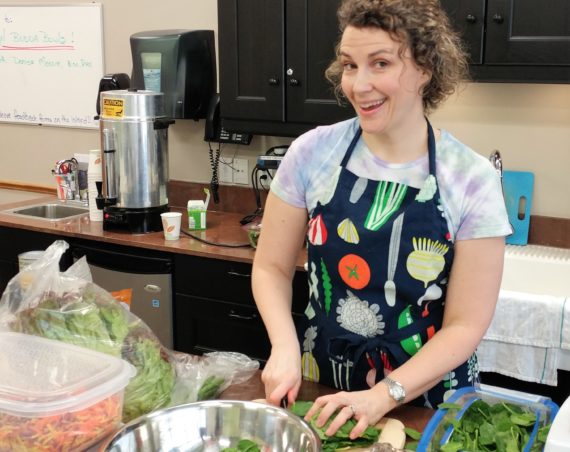Anxiety can show up in many different ways, and knowing how to manage and overcome anxiety can be difficult. We wanted to know what we can do to help reduce the tension of anxiety so we connected with Toronto-based Holistic Nutritionist Carley Nadine. She uses a realistic approach to help you understand your own body and simplify the complex world of nutrition, giving you the tools you need to improve your health for a balanced, happy and abundant life.
We chatted with Carley about how stress and anxiety show up in our bodies, what makes it worse and some foods that can help to squash stress.
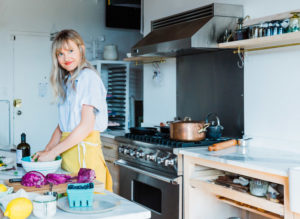 WEHL: Tell us a little about yourself and why you became interested in holistic wellness.
WEHL: Tell us a little about yourself and why you became interested in holistic wellness.
CN: Six years ago, I was dealing with digestive issues, irregular periods, acne, anxiety and an eating disorder. My incredibly restrictive “diet” mainly consisted of Diet Coke and protein bars. My hair wasn’t growing, my nails were brittle, I had terrible acne on my face, jaw line and back, I had constant headaches and I was always tired. I felt physically, mentally and emotionally drained. Like many people, I didn’t understand what truly nutritious food was, and I felt a lot of anxiety around eating. I knew that something had to change.
I began eating a plant-based diet and started an Instagram account to connect with like-minded individuals. I became incredibly passionate about whole food, sustainable agriculture and holistic health. I began to heal myself through food/lifestyle and I wanted to help others achieve the same. This led me to pursue a career as a holistic nutritionist.
WEHL: What is your philosophy on wellness?
CN: What I have come to realize is there is no perfect diet. Each and every person’s body is different and unique. What works for one person might not work for another. My philosophy is to practice mindfulness, eat local, whole, and organic food 80% of the time, and let it go the other 20%. If you try to be perfect all day every day this can seriously affect your mental health (I know from experience).
I honestly believe that mental health and self-love is just as important as what we eat.
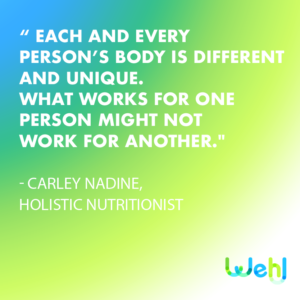
WEHL: Why did you decide to become a holistic nutritionist?
CN: I decided to become a Holistic Nutritionist because I wanted to serve my community doing something that I love. It is my passion to educate and empower others to eat real food that doesn’t come in a package, get into the kitchen and start getting passionate about cooking.
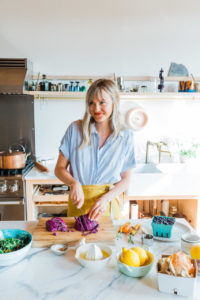 WEHL: You have a focus on stress and anxiety; why are you drawn to this topic?
WEHL: You have a focus on stress and anxiety; why are you drawn to this topic?
CN: I am mostly drawn to this topic because I have experienced it myself and have found natural ways to reduce it that I want to share with my community. It is so common in this modern age and is the root cause of many health issues.
WEHL: How can stress and anxiety show up in our bodies?
CN: There are countless ways that stress can show up in our bodies, from your brain to your digestive system. It also varies depending on the person. Here is a list of some ways that stress can affect the body:
- Stress affects your digestive tract. It can cause acid reflux as well as exacerbate symptoms of irritable bowel syndrome and inflammatory bowel disease. Not to mention create butterflies in your stomach.
- Stress messes with your immune system. A number of studies show that stress lowers immunity, which may be why you’re likely to come down with a cold after a crunch time at school or work.
- Stress Increases Pain: Links between pain severity and chronic stress have been established with headaches, joint pain and muscle pain. Stress seems to intensify arthritis pain and back pain. Work stress is associated with backaches, and stress increases the occurrence and severity of tension headaches.
WEHL: What are some things that make stress and anxiety worse?
CN:
- Sugary and Processed Foods: Sugar and refined carbohydrates can give you blood sugar highs and lows throughout the day, increasing anxiety, nervousness and fatigue. These foods can cause mood swings and alter your energy levels, making it more difficult to get your anxiety symptoms under control.
- Lack of sleep: a lack of sleep inhibits your ability to cope with even normal amounts of stress, and negatively affects your mood and outlook.
- Caffeine and Alcohol: These can increase anxiety symptoms like moodiness, nervousness and the jitters. Consuming too much caffeine can induce anxiety symptoms, and people with panic disorder and social anxiety seem to be particularly sensitive to the effects of caffeine. Limit coffee or black tea to no more than one cup per day.
WEHL: What kinds of foods can help us squash stress and overcome anxiety? How do they help us?
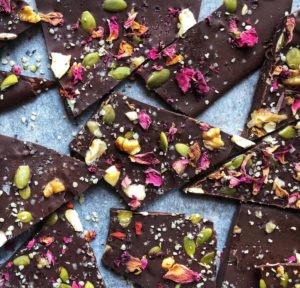
CN:
- Green Leafy Vegetables: Dark leafy greens like spinach are rich in folate, which helps your body produce mood-regulating neurotransmitters, including serotonin and dopamine.
- Adaptogenic Herbs: When I feel anxious and overly stressed I cut back on coffee and swap it out for herbal tea. One of my favorite herbs to incorporate for stress is Holy Basil. Holy basil or Tulsi functions as an adaptogen, enhancing the body’s natural response to physical and emotional stress. Adaptogenic herbs do not alter mood, but rather, they help the body function optimally during times of stress. Studies have shown that holy basil also strengthens your immune system, supports liver function and improves digestion.
- Fermented Food: The secret to improving your mental health is in your gut, as unhealthy gut flora can have a detrimental impact your brain health, leading to issues like anxiety and depression. Beneficial bacteria have a direct effect on brain chemistry, transmitting mood- and behavior-regulating signals to your brain.
WEHL: What kinds of activities do you recommend to reduce stress and overcome anxiety?
CN: My top 3 activities to reduce stress are:
- Spend time in Nature: This can help relieve stress and anxiety, improve your mood, and boost feelings of happiness and wellbeing.
- Movement: Regular physical activity helps to improve sleep quality, reduce inflammation, boost confidence, improve energy levels and ease stress and tension.
- Guided Meditation: Even just for 10 mins a day. I love the app Calm + Headspace.
WEHL: What tips do you have to help us reduce stress during our workdays?
CN:
Start the day with positive thoughts.
At the beginning of your workday, or when you first wake up in the morning, focus on the things that are going well in your life and that you are grateful for. Listing three things that you’re grateful for before you get out of bed in the morning can put you in a better mood for the whole day.
Focus on what you can control.
Much of the anxiety we experience is over the uncertainty caused by things outside our control. The best way to combat that is to only focus on the things we can control – like our effort, our attitude, and how we treat people – rather than the outcomes we can’t.
Get enough sleep.
At night, turn off screens 1 hour before you want to go to bed. Whether it’s TV, laptops, or our smartphones, screens keep our brains engaged and make it difficult for us to fall asleep.
WEHL: What tips do you have to reduce stress during a holiday season or busy time in your life?
CN: Feeling depressed or anxious is not unusual during the holiday season. Dinners, parties, and other family or friend gatherings may cause a great deal of stress. Here are some mindful tips for the holidays.
- Wash the Dishes: That’s right. Recent research indicates that doing the dishes can have a calming effect. The trick is to pay attention to the minute details of washing the dishes. This can bring you back to the present moment. Notice how the water feels on your skin and its temperature. Smell the soap. Pay attention to each plate, its shape and feel. Thoroughly engage your senses in the task. You’ll end up with clean dishes and a clearer mind.
- Take a break: If situations get overwhelming, take a small, five-minute break. Removing yourself from the situation and practicing mindfulness can help reduce stress.
- Walk around the block. Sit alone in your room. If the only place to escape is the restroom — go for it. Take deep breaths. Focus on colors, sights and sounds.
WEHL: What are some of the best types of exercise for stress and anxiety?
CN: Honestly, whatever you enjoy doing that gets you moving and works for you.
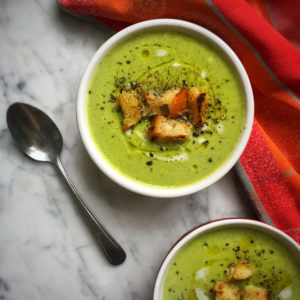
Personally, I find that lower intensity yoga and pilates work best for me.
WEHL: Do you have a stress-busting recipe that you’d like to share?
CN: Of course! I love this creamy broccoli soup. It’s filled with leafy greens, fibre and healthy fats. I’m sure you’ll love it! You can find the recipe here.
Connect with Carley:
- Web: www.carleynadine.com
- Email: [email protected]om
We invite you to join our all-in-one healthy lifestyle app at Wehl.com!


